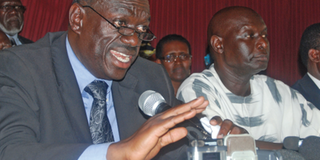Opposition, chiefs call for protests

DEMO CALL: Dr Besigye (L) and Mr Otunnu at the press conference in Kampala where they called for peaceful demonstrations to push the government into organising fresh elections. PHOTO BY ISAAC KASAMANI
Uganda’s main opposition leaders yesterday called for peaceful protests against President Museveni’s leadership and also demanded that fresh, free and fair elections be held under certain minimum conditions. The government, however, received news of this development without flinching.
Force threats
Information minister Kabakumba Matsiko told Daily Monitor that the government is well-equipped to quash any opposition uprising. “Their call is of no consequence because we shall easily suppress them,” Ms Kabakumba said yesterday.
In a joint statement read to the press and supporters after a meeting in Kampala yesterday, Dr Kizza Besigye (FDC/IPC), Olara Otunnu (UPC), Mr Matthias Nsubuga representing party president Norbert Mao (DP) and independent candidate Walter Sam Lubega repeated the accusation that the presidential election was a “big sham”.
The four, who alongside another candidate, Jaberi Bidandi Ssali, have previously said they will not recognise the new government to be sworn-in, in May, said other constitutional options in the quest for democracy have failed.
“It is now clear that Ugandans cannot advance democracy through elections, the courts or Parliament under Mr Museveni and the NRM leadership,” said Dr Besigye reading from the statement.
“We have explored several constitutional options with no success … The only option left, that is allowed by the Constitution and which is peaceful to challenge the results of this sham election, is for the people to assert their sovereign power under Article 1 of the Constitution.”
On Sunday, the Electoral Commission declared Mr Museveni winner of last Friday’s poll with 68 per cent. Closest challenger Dr Besigye trailed at 26 per cent. Mr Museveni has threatened to jail any opposition politician who incites unrest, as well as any individual who attempts to demonstrate against the results.
But the four former presidential candidates have appealed to Ugandans to take to the streets, and also asked opposition leaders in the districts to organise peaceful rallies in support of the call for fresh elections.
“The time is now for the people of Uganda to rise and peacefully protest against the outcome of the 2011 elections and demand that no further fraudulent local government elections be conducted by the existing partisan EC,”
Dr Besigye said. “We reject any government that may be formed out of these sham elections and demand that an independent, competent and representative EC, composed through criteria agreed by all stakeholders be established.”
Democracy stifled
The opposition leaders accused Mr Museveni and the NRM party of stifling multiparty democracy in Uganda. Together, they are criticised for standing in the way of constitutional and legal reforms “through reckless misuse of their parliamentary majority”.
The statement observed that, “For the last two decades, the people of Uganda, through their opposition political parties and civil society have been in the protracted struggle for a peaceful and genuine democracy. At every turn the NRM and Mr Museveni have been obstacles to the people’s aspirations. Even when he was prevailed upon by internal and external forces to embrace multiparty politics, Mr Museveni did so reluctantly and continues to undermine its genuine operation.
It additionally makes the point that Ugandans’ participation in the last four general elections has been frustrated by the NRM and Mr Museveni who jointly “subverted the will of the people through cheating and violating their human rights.”
The statement spoke of the opposition’s and civil society’s filing of numerous court cases in a bid to bring about political reforms. But that these efforts were frustrated when court either dismissed them “on questionable grounds or are still not yet heard and concluded”.
Mr Lubega, who criticised the international community after they “quickly endorsed a fraudulent election”, said it was time for Ugandans to assume their constitutional responsibilities. “No matter the amount of intimidation, no matter what amount of soldiers Mr Museveni will deploy, the people of Uganda remain the most powerful,” Mr Lubega said.
Mr Otunnu said since democratic change of government under the current rules, structures and processes is now impossible, Ugandans should “step outside the system and confront Museveni on their own terms.”
“We can choose to remain slaves in our own country, we can choose to be subjugated by Mr Museveni, we can choose to remain subjects or we can choose to remain owners of our country, to be citizens or to be masters of our land.”



